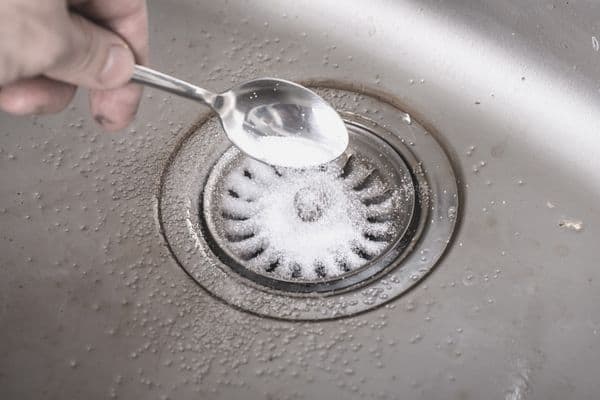Unpleasant smells emanating from a drain plug are no fun at all. In most cases, the cause of the nasty smell is a buildup of food particles, soap particles, and other organic matter trapped in the drainage pipes.
In this post, we’ll explore how to get rid of smelly drains using 9 different methods, all of which are cheap, easy, and won’t take up much of your time.
In addition, we’ll also explain why drain smells occur, how to identify them and how to prevent a foul smelling drain in the first place.
Contents
9 DIY Methods to Get Rid of Sink Drain Smells
Getting rid of terrible bathroom or kitchen drain odors is simple with one of the 9 methods below.
- Use Boiling Water and Dish Soap
- Use Hot Distilled White Vinegar
- Use Baking Soda and Vinegar
- Use Coarse Salt and Baking Soda
- Use Ice Cubes and Lemon Peels
- Remove Drain Clog
- Fill Your P-Trap
- Remove Air Vent Blockages
- Flush the Drain with Chemical Products
1. Use Boiling Water And Dish Soap
To get rid of stinky drain smells, you can try using boiling water and soap.
- Boil hot water in your kettle or on the stove.
- Pour half of the boiled water in and let it sit for a minute.
- Add around 1 tablespoon of liquid dish soap.
- Pour the other half of the hot water and allow it to sit for 10 minutes.
- Rinse the sink with cold running water for several minutes to flush out any debris or bacteria.
- Repeat as necessary.
This method is great for removing any built-up grease or grime that may be making your kitchen or bathroom sink smell. The hot water and soap will break down the grease and flush it out of the kitchen drain, leaving it smelling fresh and clean.
2. Use Hot Distilled White Vinegar
To get rid of a bad smell coming from your drain using hot vinegar, follow the steps below.
- Heat 4 cups of distilled white vinegar in a microwave-safe container for 30 seconds on high heat or on the kitchen stove.
- Pour a cup of the hot vinegar down the drain and let sit for a minute.
- Pour down another cup and let the water run for a minute or two.
- Repeat with the remaining vinegar and boil more if the unpleasant odor remains.
Hot vinegar is acidic and will help dissolve any built-up gunk or grime that may be causing the stinky. The vinegar’s acidity also helps to neutralize and absorb odors.
3. Use Baking Soda And Vinegar
Pouring vinegar and baking soda down the drain to eliminate foul odors is an effective method. Follow the steps below.
- Run the hot water tap for a few seconds.
- Pour in one cup of baking soda.
- Slowly pour 1 cup of hot vinegar (can also be heated on the stove) over the baking soda.
- Wait 5-10 minutes for the mixture to stop foaming.
- Flush with hot tap water to clear away any debris or residue.
- Repeat the process if necessary.
This method combines a base substance and acid – baking soda (sodium bicarbonate) is a base substance and when combined with acidic vinegar (acetic acid), creates a chemical reaction that breaks down and dissolves grease, grime, and other debris causing the funky smell in your drain pipe. The hot water flush helps remove lingering gunk and neutralize odors.
As an alternative, you can use lemon juice instead of vinegar. Simply mix the baking soda and lemon juice together and slowly pour it down the drain. Leave for a while and pour boiling hot water to remove any rotting food, odor-causing bacteria, and other gunk. Easy!
4. Use Coarse Salt And Baking Soda
Using a combination of coarse salt and baking soda can help neutralize foul smells.
Mix equal parts of baking soda and salt, and pour the mixture down your kitchen sink drain. Let it sit for a few hours before flushing with water. This should help break down any blockages and eliminate bad odors coming from your kitchen drains.
5. Use Ice Cubes And Lemon Peels in Garbage Disposal
Lemon peels provide natural cleaning properties to help get rid of a smelly garbage disposal.
- Save the peels from a few lemons and put them in an ice cube tray with water in the freezer.
- Pour some very hot water into the drain.
- Drop a few cubes into your garbage disposal system and turn it on with the cold water on.
- Follow up with more boiling water.
- Repeat the process if necessary.
6. Remove Drain Clog
The disagreeable smells emanating from your bathroom or kitchen sink may be caused by a clogged drain. To remove the clog (and the smell) use vinegar and baking soda, a plumbing snake, or a store-bought cleaner.
7. Fill Your P-Trap
Ensuring that your kitchen and bathroom p-traps have functioning water seals is a surefire way to get rid of the foul sewage smell
A P-trap is a U-shaped pipe located under the bathroom sink. The curved portion should always have water in it to prevent foul-smelling sewer gasses from rising through the drain from the sewer lines and creating a potential health hazard. A dry P-Trap is a common issue with bathroom sinks that are not used frequently.
The solution is to simply pour cold water into the drain to prevent the sewer gas from being able to make its way into your house.
8. Remove Air Vent Blockages
A common reason for for foul drain odors is blockages in your air vent system.
Vents in plumbing systems allow trapped gasses to escape through the pipes and dissipate outside, preventing unpleasant odors in the home. If the vent becomes blocked, gasses can leak out through the drains, resulting in unpleasant smells.
All you have to do is find the blocked air vent and remove the blockage.
9. Flush The Drain With Chemical Products
If all the above methods have failed, you may want to turn to harsher, store-bought chemical products such as bleach or drain cleaner too help fix smelly drains.
Why Do My Sink Drains Smell?
Smelly odors emanating from a sink or shower drain can come from a variety of sources, including rotting food scraps in your garbage disposal, hair clogs, bacteria and mold growth, and even sewer gases.
The first step is to identify which drain(s) is affected, and what is causing the smell. These often fall under one of the following.
- Rotting organic debris stuck in your drains such as food, hair or soap scum that is starting to smell.
- Clogged drain or sewer line
- An unused drain no longer has a water seal in its p-trap resulting in sewer gases leaking into your home.
- Blocked ventilation system
How To Get Rid of Those Shower Drain Smells?
The reasons your bathroom smells like rotten eggs is typically because of smelly shower drains clogged with hair, or a less frequently used drains p-trap running dry.
Why Does My Floor Drain Smell Like Sewage?
The most common reason for a smelly floor drain is a dry p-trap. Floor drains seldom get flushed through and over time their p-trap will dry out as the water evaporates.
How Do You Prevent Stinky Sink Drain Odors?
To prevent future odors from occurring in your follow these simple tips.
- Use a sink strainer to catch food, hair or other debris from entering your drain pipes.
- Regularly clean your drains with one cup of vinegar and one cup of baking soda.
- Regularly check your ventilation system for blockages
How Often Should You Clean a Drain to Prevent a Smelly Sink?
We typically recommend cleaning your drains monthly.
When Should I Call A Professional?
When dealing with stinky drains, there may come a time when it is necessary to call in a professional plumber. This is particularly applicable if you have noticed that the smell is increasing or not going away after attempting to clean the drains yourself.
In such cases, there is likely an issue with the plumbing system – for instance, a clogged sewer line – and getting your drains clean will require expert knowledge and tools to resolve properly.

